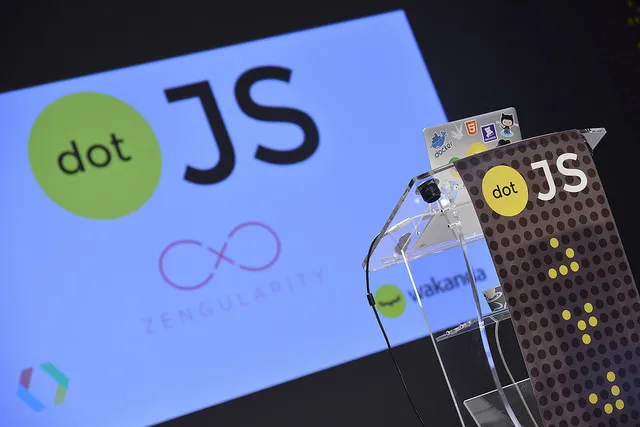
DotJS 2014: Big stars don't make a great event

Last monday, all the marmelab team went to the DotJs 2014 conference in Paris. We were very excited, because the 2013 conference was really instructive, and provided a lot of inspiration for our work. Plenty of Javascript famous speaker were announced this year, like Paul O’Shannessy, maintainer of ReactJs, Domenic Denicola, member of the ECMAScript TC39 Standardization Group, Julien Lecomte, lead dev of YUI, etc.
The train we took was late, so we arrived in the middle of Substack’s talk. It was a general overview of the various tools he currently works on. It was original, without slides, but with lots of code. He showed how to use the browser appcache with versioning to make an infinite scaling application. He talked about hyperboot, keyboot & forkdb, helpful libraries he wrote to simplify app caching. It was interesting to see how a - not so well known - existing technology like appcache file can be used to lighten a webserver.
After his presentation, he said that in programming environment it’s the ecosystem that matters, not the syntax and If you don’t have a job, you get busy with everything else - that made all the audience laugh.
Then Charlie Robbins talked about how we can use npm to graph module dependencies.
Graphs can be used to know which modules are the most used in production, or which version is the most used. He left me unsatisfied about how we can make these graphs ourselves, and other example of concrete application of this data mining. It was very theoretical speech without concrete example.
Justin Meyer presented the Javascript checklist that he wrote by analyzing 40 projects he participated in. His analysis helped detect how a given condition affects the success of development projects. For instance, user testing has a positive weight of 0.45, production release in less than 6 month a positive weight of 0.48, etc… This helped him prioritize the items in the checklist. This presentation wasn’t specific to Javascript ; the check-list concerns the project, not the technology used.
Then Domenic Denicola, creator of jsdom and member of the ECMAScript TC39 Group, the group that writes the spec for ECMAScript 7, entered the stage. He presents jsdom, a javascript implementation of the DOM for NodeJs on every platform (Linux, Windows, OSX). It’s supposed to support a large portion of the HTML5 stack, including canvas (to flip images, add CSS transformations, etc). The talk was focused essentially on the jsdom library, nothing about how he built it nor about the future of ECMAScript. That left me with the feeling of a self-promotional talk for his specific library, not the kind of speech I expected.
After a short 1 hour and 30 minutes of talk, Sylvain Zimmer, the organizer of the event, introduced dotPost: a magazine for developer edited by dotConference.
After a the lunch with good French cheese, verrines & delicious deserts, lightning talks began with presentation of:
- JSON Web token: A cookie killer
- meteorJS: A websocket library
- pouchdb: Fast key/value database
- npm package quality: List of elements to rate npm module
Talks started again with Julien Lecomte, lead of YUI. He was surprised to be described as lead of YUI because when he arrived at Yahoo! they decided to deprecate YUI. Julien told us what YUI2 will look like. They bet on the adoption of ES6 in the beginning of 2015 & YUI will use ReactJS. For older browsers, they provide a CDN for shim (polyfill service) that will provide shims depending on the User Agent of the browser: no useless polyfill will be loaded.
Angus Croll began his talk by an apology for his stammer, but the speech was really fun & interesting. Angus spoke about how to support a developer to experiment by itself. A good developer is a developer who learns by failing. For him Playing is Learning. He introduced his book If hemingway wrote Javascript, with fun examples of how to compute prime number in different ways. Angus was much applauded at the end of his presentation.
Mike McNeil then talked about how to document a method in Javascript. He showed how to wrap the method in a object with some fields describing arguments, return type, etc. Everybody was disappointed with the quantity of additional code this approach requires.
Then the creator of lodash, John-David Dalton talked about how custom function can be faster that Javascript built-in. He also said that sometimes, third-party libraries are faster than shim, a wink to lodash & underscore.
With a warm Spanish accent, Soledad Penadés presented the WebAudio API & openmusic. Even if the presentation was interesting, I think that only few people of the audience will be interested by using such advanced features of WebAudio.
The CEO of NodeSource, Joe McCann introduced 2 or 3 tricks to improve NodeJS performance. He began with a brief explanation of “How to not make V8 think”, like avoiding megamorphic function, type change for a variable, mixing type in array, etc. Then Joe introduced V8 flags like max_inlined_source_size or allow-natives-syntax to micro-tune your nodeJS code.
An awaited speaker was Paul O’Shannessy, the maintainer of ReactJs. His talk was about how React was created & its future for the version 1.0 (ES7, API stabilisation, CSS in JS, Web workers, layout & animations…). For new comer of React like me, it wasn’t the talk I expected. Paul spoke for regular users of React ; I think he targeted few people in the audience.
Finally, Yehuda Katz the creator of emberjs spoke about independent open source software. He told that if we don’t die, we can retry later. Developers should stay healthy, make real apps & diversify the core team of their projects (with non techy). Maintainers should communicate their vision to the community, ignore the haters & listen to the community. Lot of common-sense tips that we couldn’t listen to the end, because we had to take our train.
Except the good organisation & the food, this dotJS was a deception for me. Plenty of famous Javascript developers but only 2 or 3 interesting talks. For me, a lot a speech were a self promotion for the speaker’s library, I returned without new ideas or inspiration. No explanation about the future of Javascript, introduction to frameworks or tool for my everyday work, growing project to follow.
The DotJS website promotes stars, not the content of they talk, that’s why we can be disappointed at the end of the event.
Authors

Full-stack web developer at marmelab, can learn any new language in about two hours. For real.